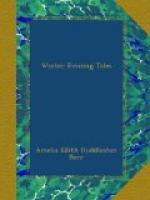When David opened his eyes again his first glance was at his father. There was something in that look that smote the angry man to his heart of hearts. He turned away, motioning Plato to follow him. But even when he had reached his own room and shut his door, he could not free himself from the influence evoked by that look of sorrowful reproach.
Plato stood just within the door, nervously dangling his straw hat. He was evidently balancing some question in his own mind, and the uncertainty gave a queer restlessness to every part of his body.
“Plato, you are to watch the young man down-stairs; he is not to be allowed to leave the house.”
“Yes, sar.”
“He has committed a great crime, and he must abide the consequences.”
No answer.
“You understand that, Plato?”
“Dunno, sar. I mighty sinful ole man myself. Dunno bout de consequences.”
“Go, and do as I bid you!”
When he was alone he rose slowly and locked his door. He wanted to do right, but he was like a man in the fury and darkness of a great tempest: he could not see any road at all. There was a Bible on his dressing-table, and he opened it; but the verses mingled together, and the sense of everything seemed to escape him. The hand of the Great Father was stretched out to him in the dark, but he could not find it. He knew that at the bottom of his heart lay a wish that David would escape from justice. He knew that a selfish shame about his own fair character mingled with his father’s love; his motives and feelings were so mixed that he did not dare to bring them, in their pure truthfulness, to the feet of God; for as yet he did not understand that “like as a father pitieth his children, so the Lord pitieth them that fear Him;” he thought of the Divine Being as one so jealous for His own rights and honor that He would have the human heart a void, so that he might reign there supremely. So all that terrible night he stood smitten and astonished on a threshold he could not pass.
In another room the question was being in a measure solved for him. Cassie brought in meat and bread and wine, and David ate, and felt refreshed. Then the love of life returned, and the terror of a shameful death; and he laid his hand upon his rifle and looked round to see what chance of escape his father had left him. Plato stood at the door, Lulu sat by his side, holding his hand. On her face there was an expression of suffering, at once defiant and despairing—a barren suffering, without hope. They had come to that turn on their unhappy road when they had to bid each other “Farewell!” It was done very sadly, and with few words.
“You must go now, beloved.”
He held her close to his heart and kissed her solemnly and silently. The next moment she turned on him from the open door a white, anguished face. Then he was alone with Plato.
“Plato, I must go now. Will you saddle the brown mare for me?”




